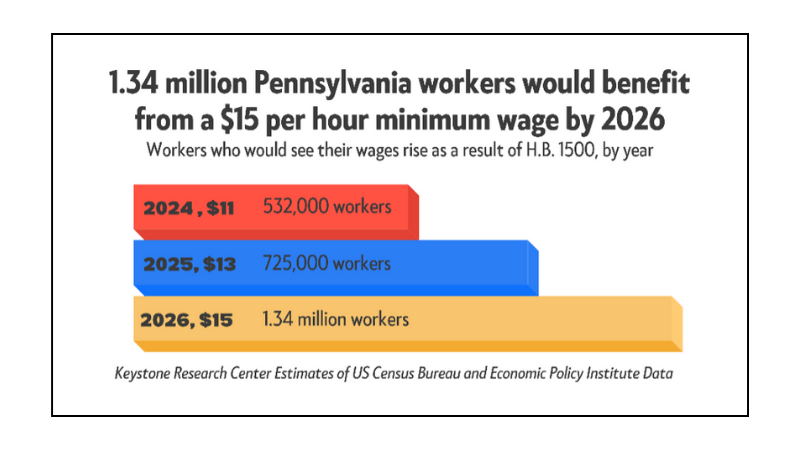On June 20th, 2023, the Pennsylvania House of Representatives passed H.B.1500. This bill is now under consideration in the Pennsylvania Senate.
If passed, this legislation would raise the minimum wage in Pennsylvania to $15 per hour by 2026 in a series of steps:
$11 per hour by January 1st, 2024
$13 per hour by January 1st, 2025
$15 per hour by January 1st, 2026.
In addition, the tipped minimum wage would be raised from the current $2.83 per hour to 60% of the regular minimum wage. The regular minimum wage would be indexed to inflation beginning in 2027. This would help ensure that the minimum wage keeps up with the cost of living for Pennsylvania’s lowest paid workers.
The Keystone Research Center estimated how many workers would benefit from this legislation.
- 2024: The minimum wage would be raised to $11 on January 1st, 2024, and 532,000 Pennsylvania workers would see their wages rise.
- 2025: The minimum wage would be raised to $13 on January 1st, 2025. An additional 193,000 Pennsylvania workers would see their wages rise, bringing the total to 725,000 Pennsylvania workers.
- 2026: The minimum wage reaches $15 per hour on January 1st, 2026. An additional 612,000 Pennsylvania workers would benefit, and the wage will then be indexed to inflation.
Overall, more than 1.34 million Pennsylvania workers would see their wages rise, the vast majority of whom are adults (89%) and are disproportionately women (60%) and people of color (30%).
 Pennsylvania’s minimum wage has been stuck at $7.25 since 2009. Every year the minimum wage is not raised, low-wage workers effectively get a pay cut because the cost of their necessities continues to rise. The buying power of the minimum wage for our lowest-paid workers has been crushed due to legislative deadlock.
Pennsylvania’s minimum wage has been stuck at $7.25 since 2009. Every year the minimum wage is not raised, low-wage workers effectively get a pay cut because the cost of their necessities continues to rise. The buying power of the minimum wage for our lowest-paid workers has been crushed due to legislative deadlock.
Decades of robust minimum wage research show that the prices of goods and services do not rise sharply after minimum wage increases, and that wage increases are not passed along to consumers in the form of substantially higher prices.[1] Recent research from the Economic Policy Institute reinforces this wealth of literature, showing that minimum wage increases have “trivial effects” on inflation, and that faster inflation actually makes it more important to raise the minimum wage.[2]
To make concrete the reality that minimum wage levels don’t drive inflation, you can compare the costs of the same fast food products in New York and Pennsylvania. As explained starting 46 seconds into this video, a Taco Bell Burrito Supreme is $4.99 in Erie Pennsylvania. It is also $4.99 in Lakewood, NY, 20 miles away, where the minimum wage in this industry is $15 per hour not $7.25 per hour.
To state the obvious, Pennsylvania is not a trailblazer on minimum wage policy. Every border neighbor has raised its state minimum wage, and our research shows that New York and New Jersey wages have risen much more in low-wage industries, and their employment have increased as much.[3] One likely reason that neighboring states employment has remained robust: more Pennsylvania workers are crossing the border to take a living-wage job and fewer New York and New Jersey workers are crossing the border to take a poverty-wage job in Pennsylvania.
[1]The Local Aggregate Effects of Minimum Wage Increases: http://doi.org/10.1111/jmcb.12684, The Effect of the Minimum Wage on Prices: https://dx.doi.org/10.2139/ssrn.524803
[2]Inflation, minimum wages, and profits, by Josh Bivens: https://www.epi.org/blog/inflation-minimum-wages-and-profits-protecting-low-wage-workers-from-inflation-means-raising-the-minimum-wage/
[3] https://keystoneresearch.org/research_publication/when-low-wage-pa-border-county-workers-want-a-living-wage-job-what-do-they-do-cross-over-into-new-york-or-new-jersey/